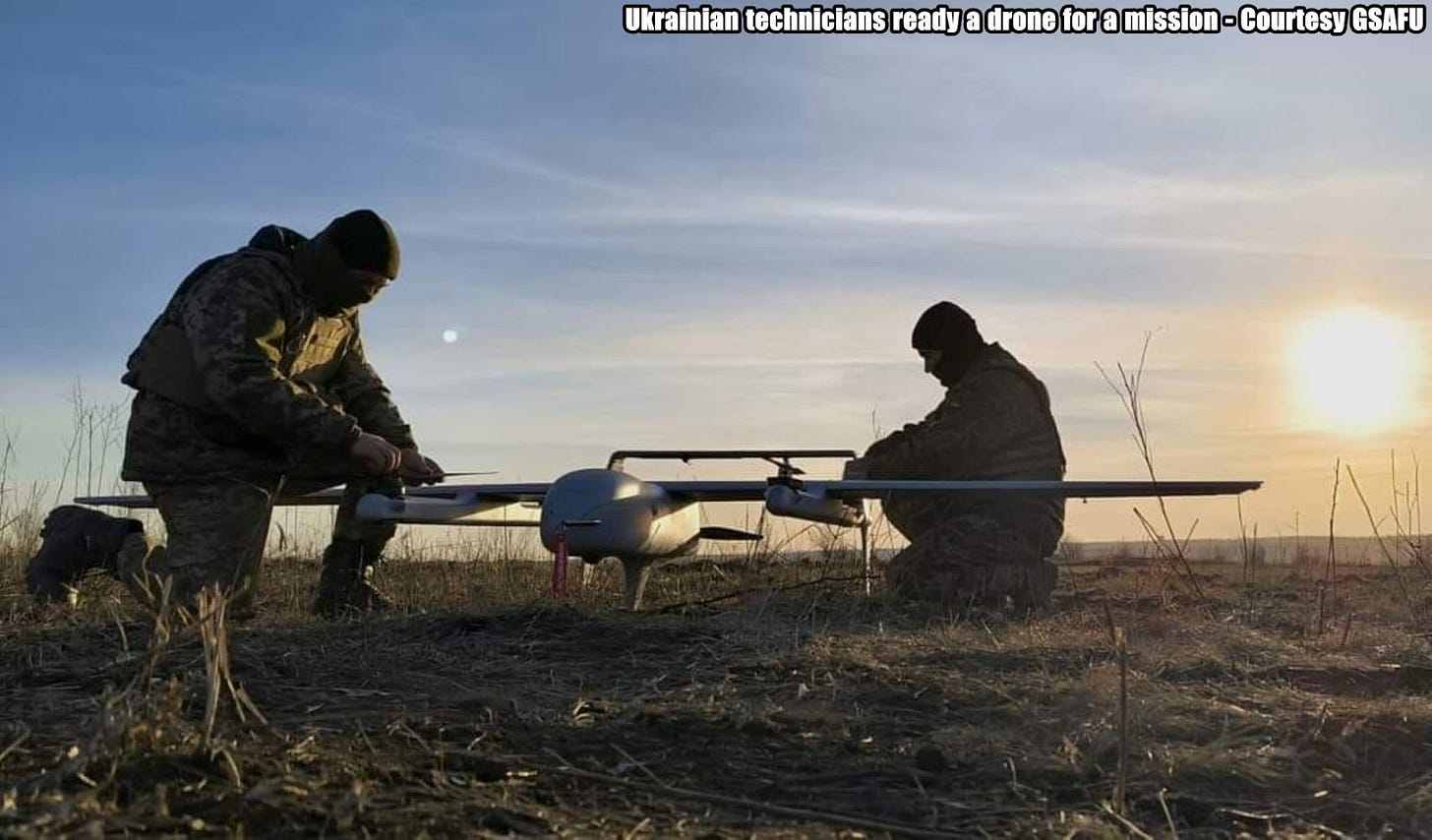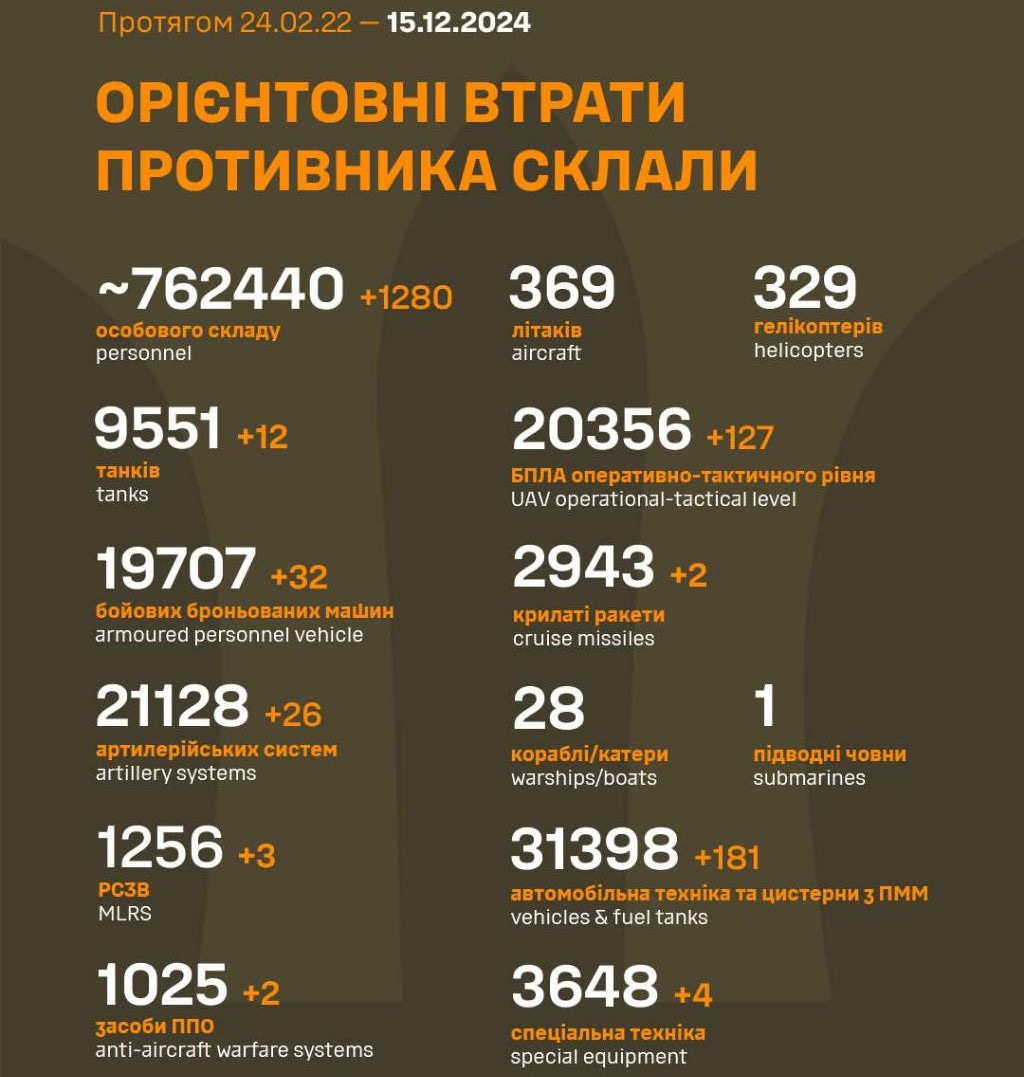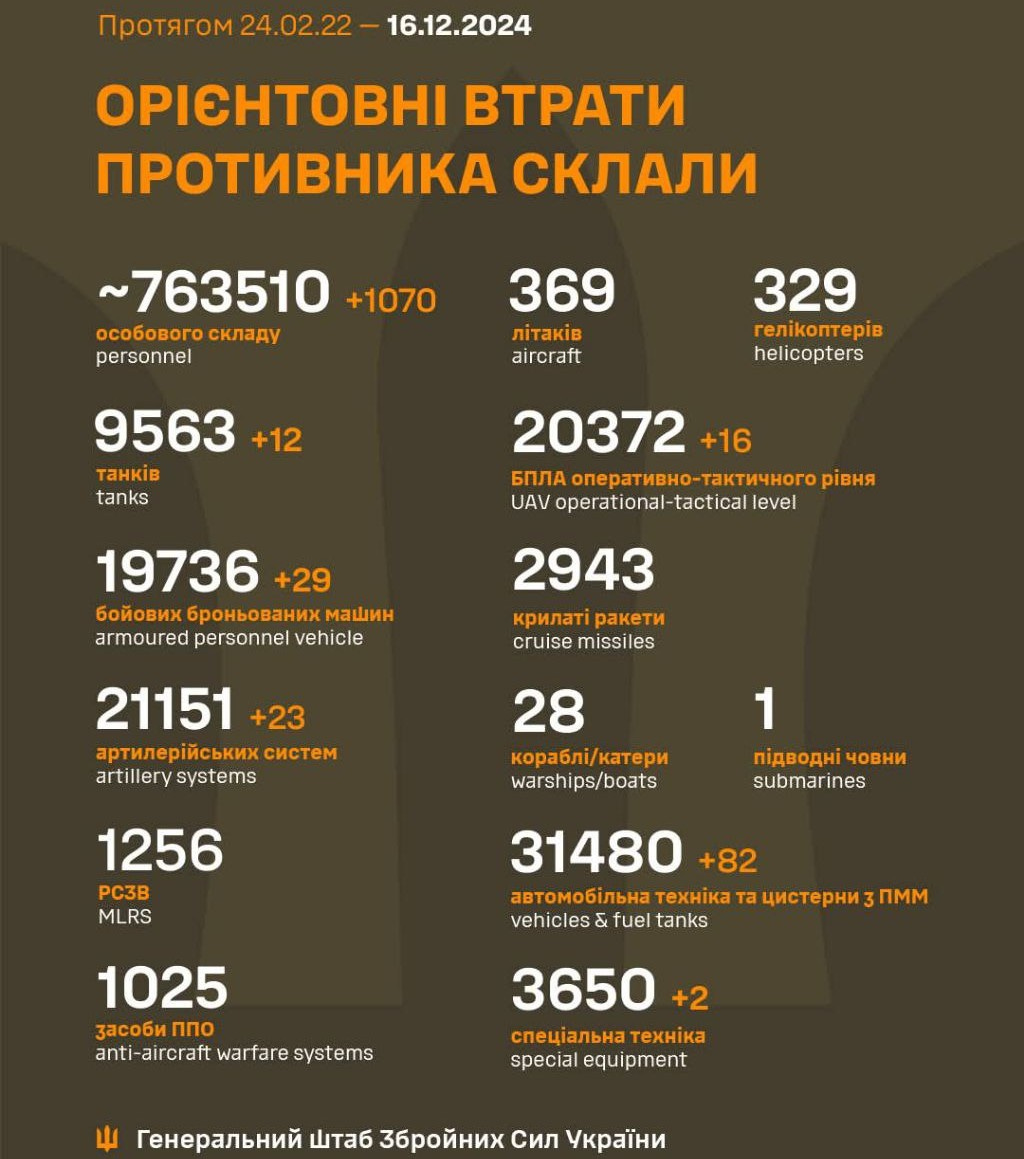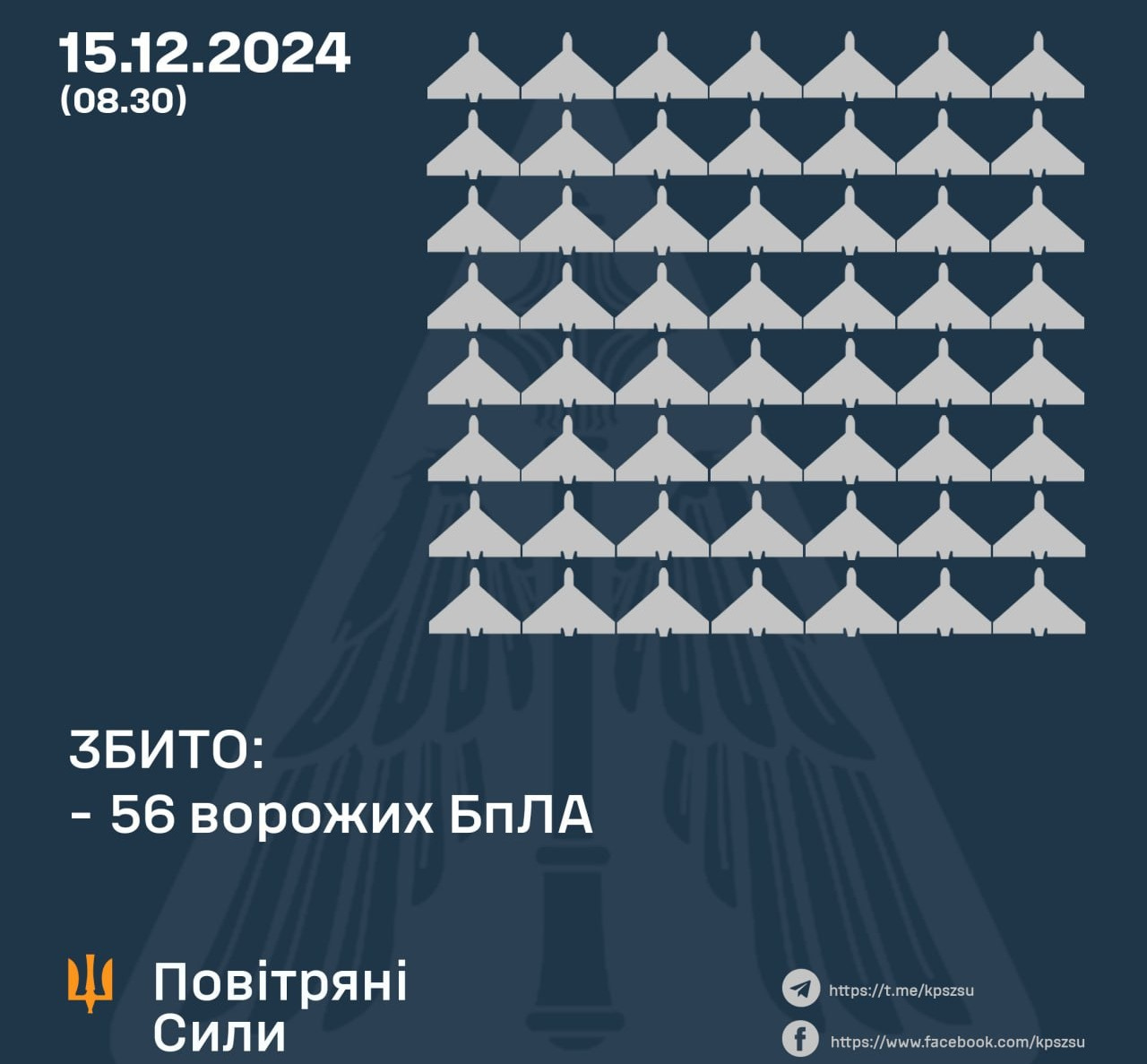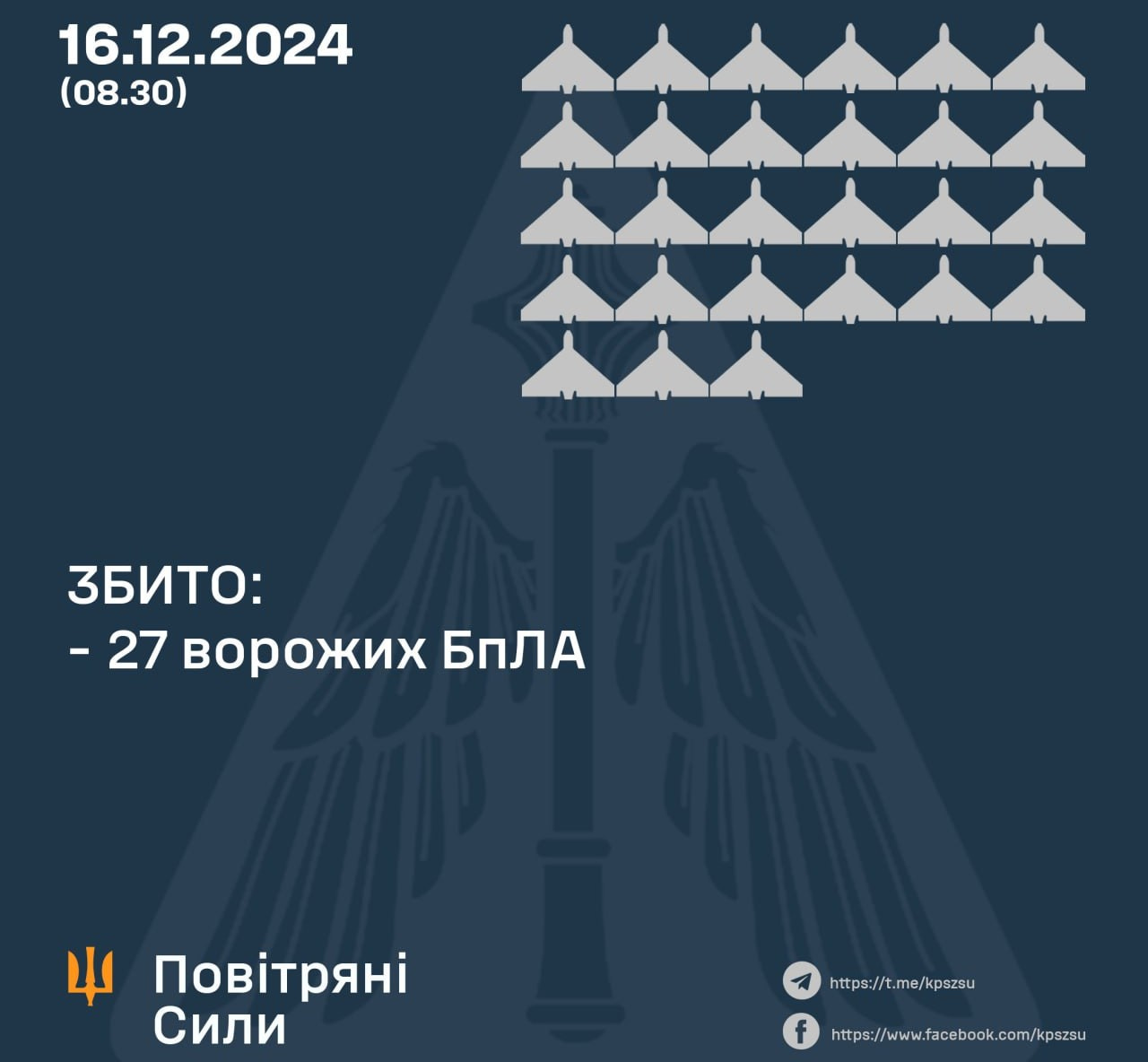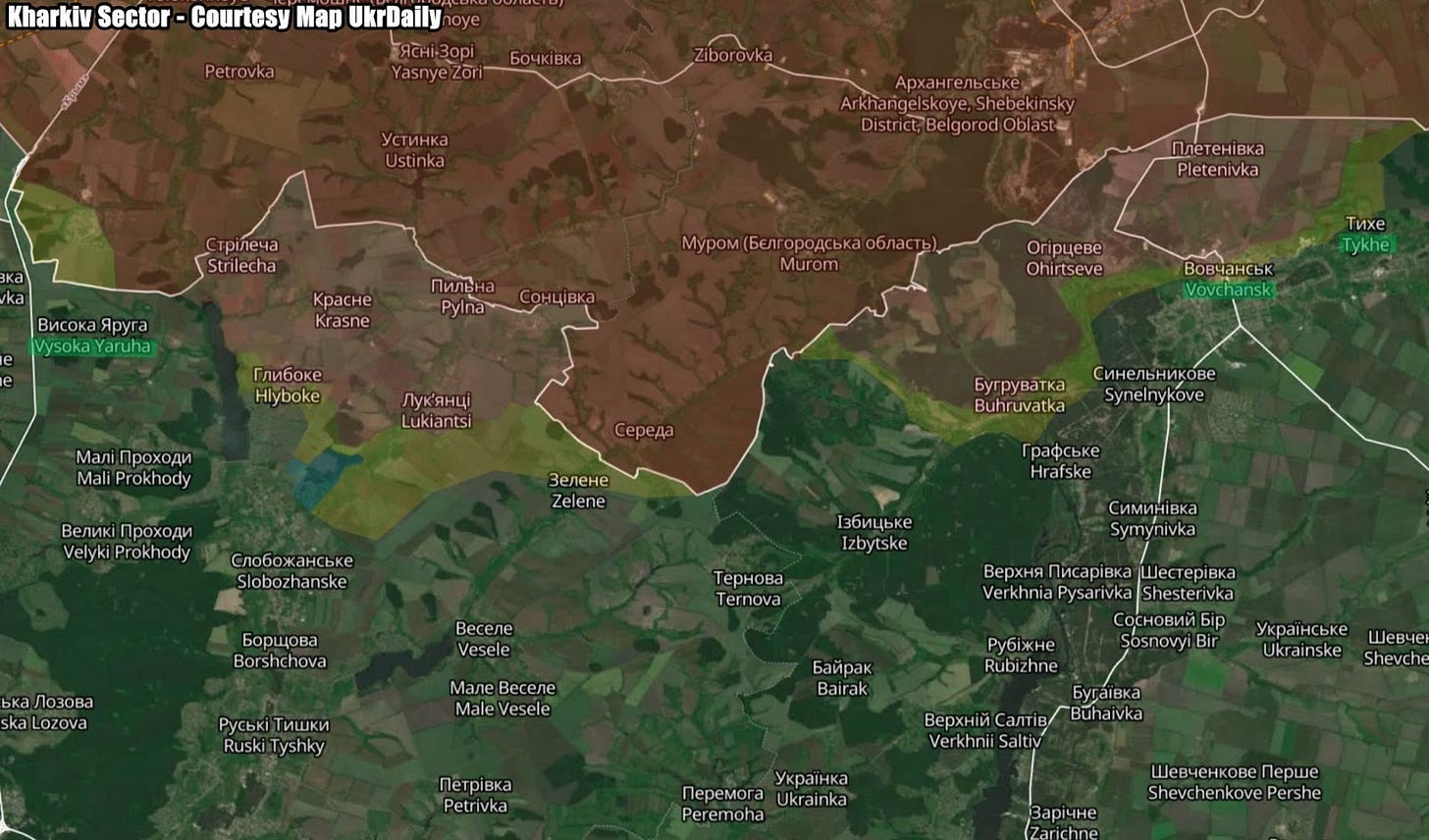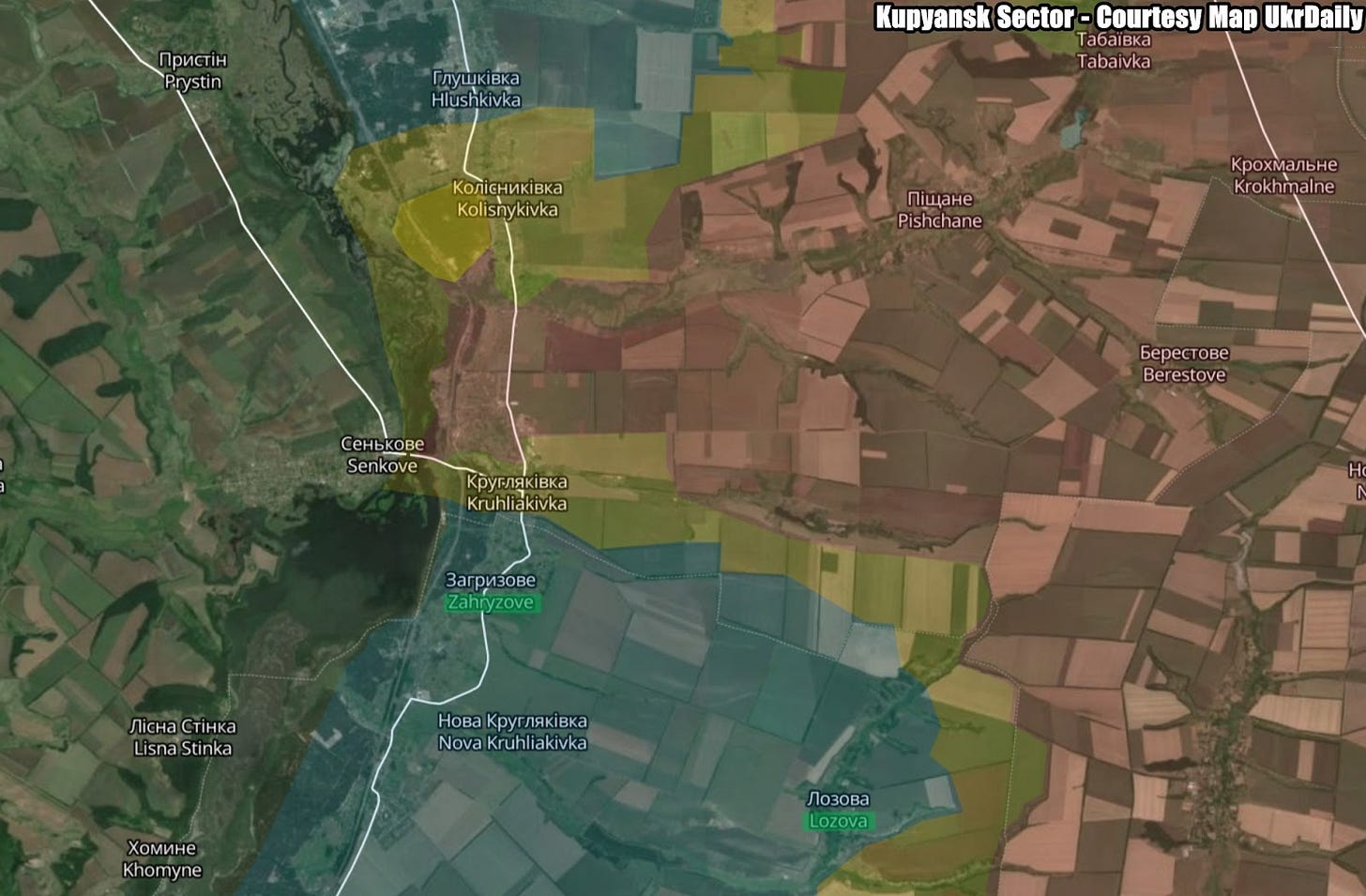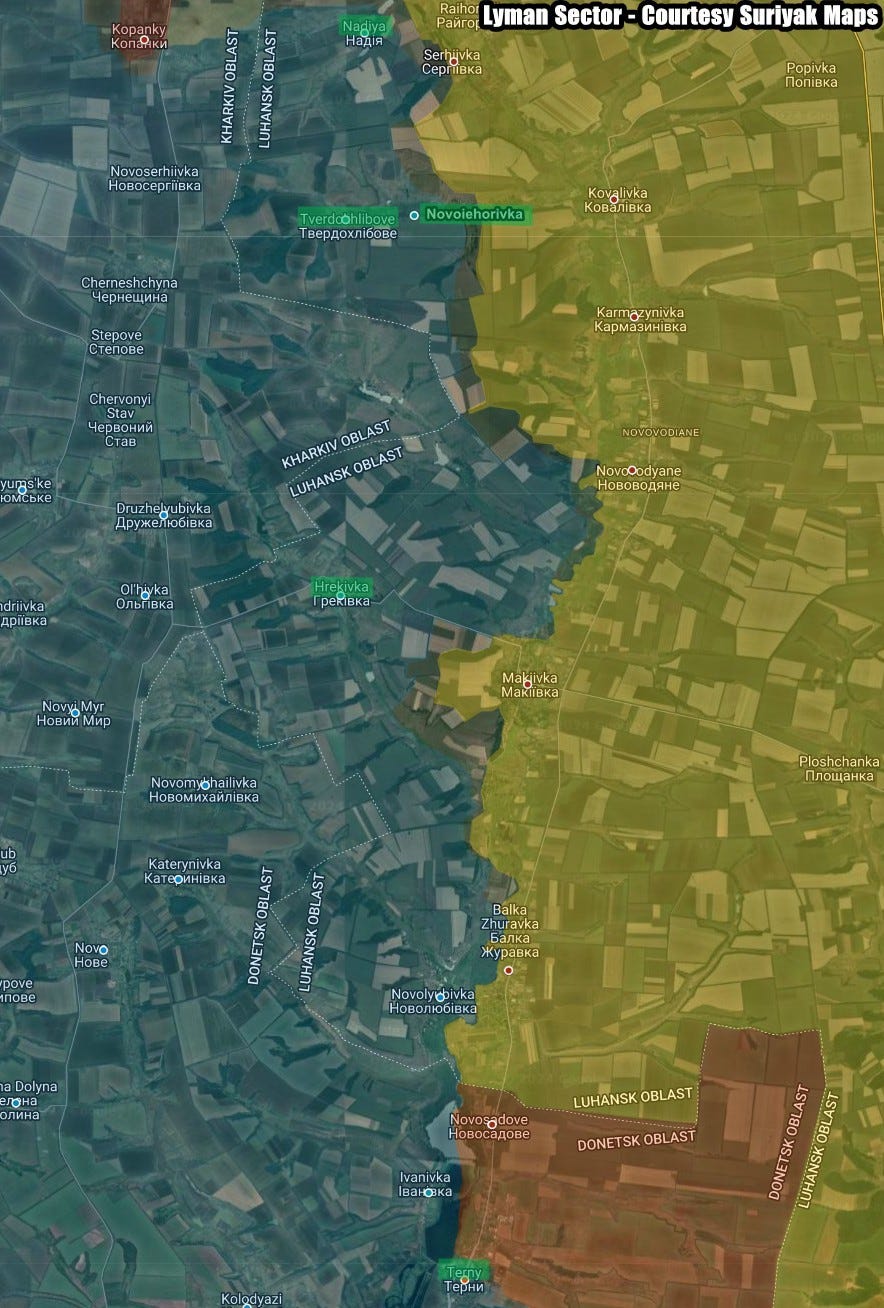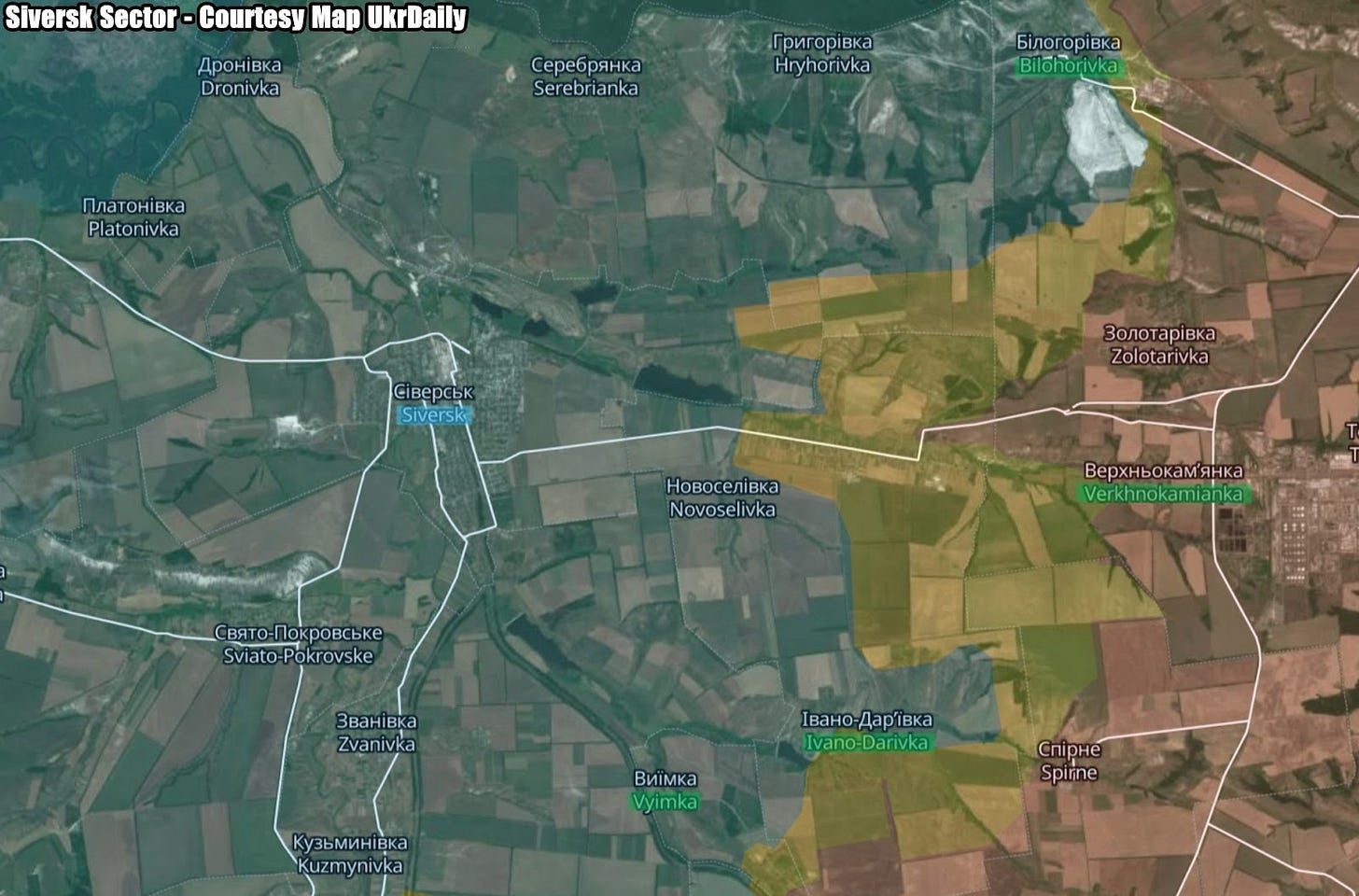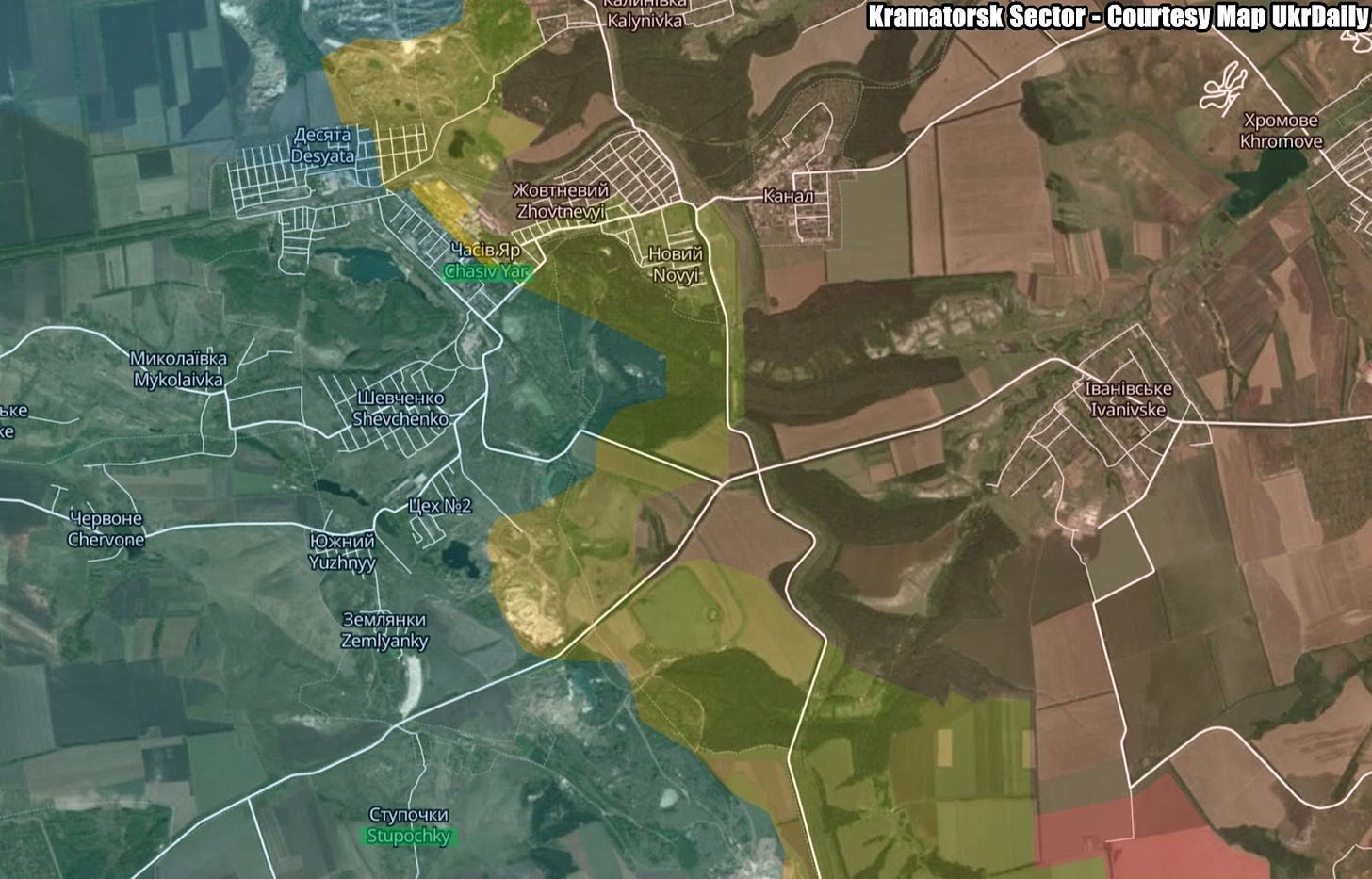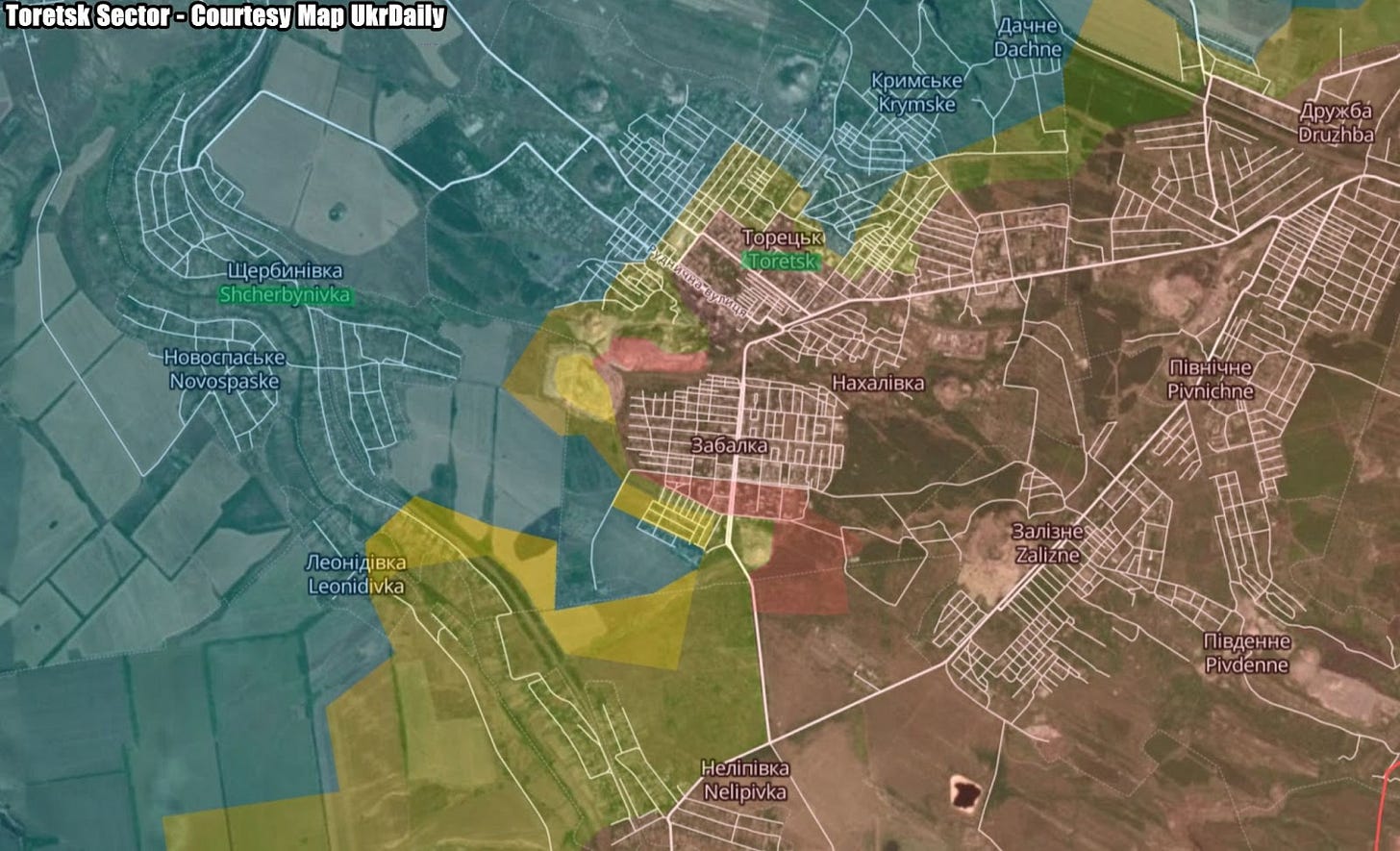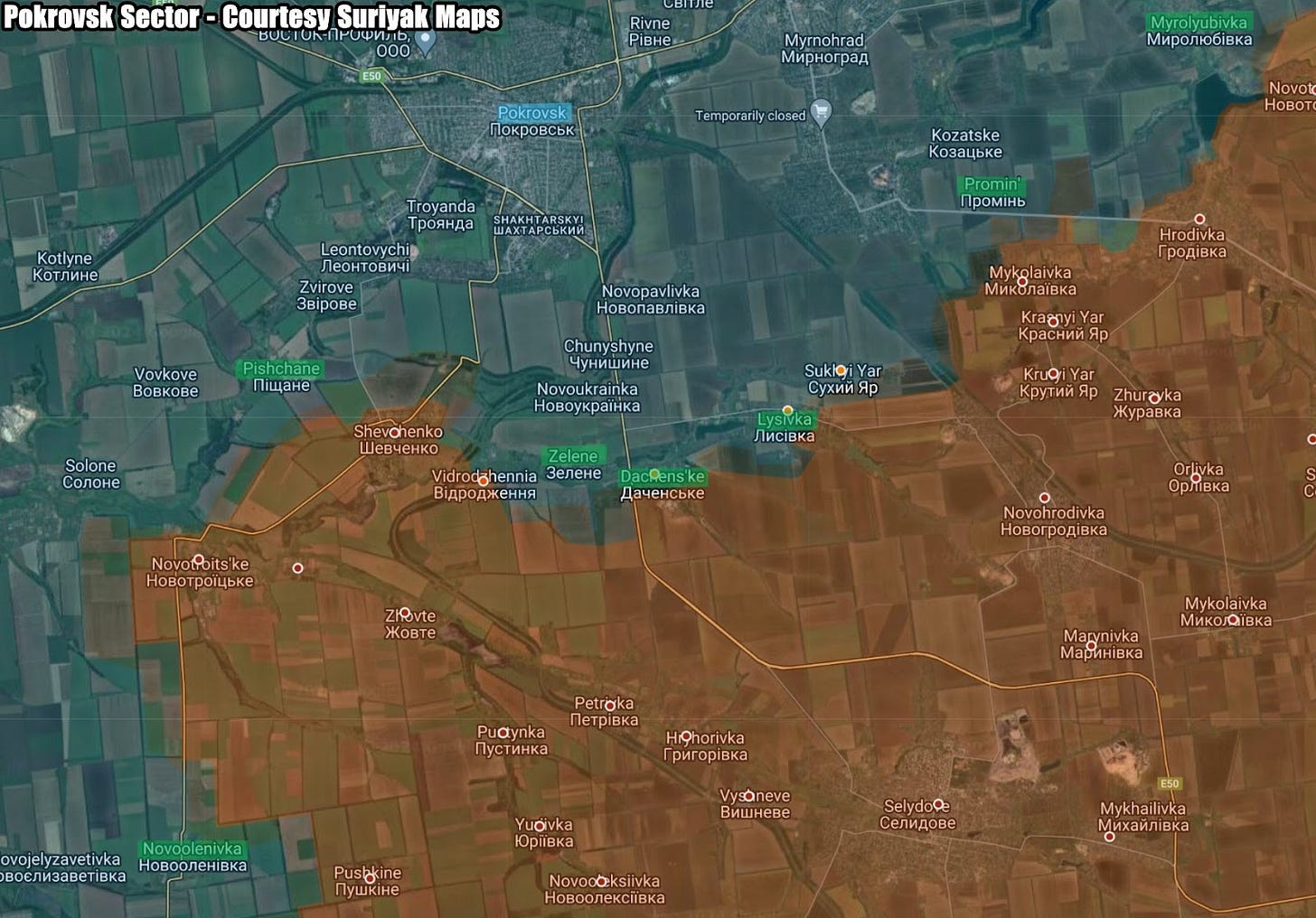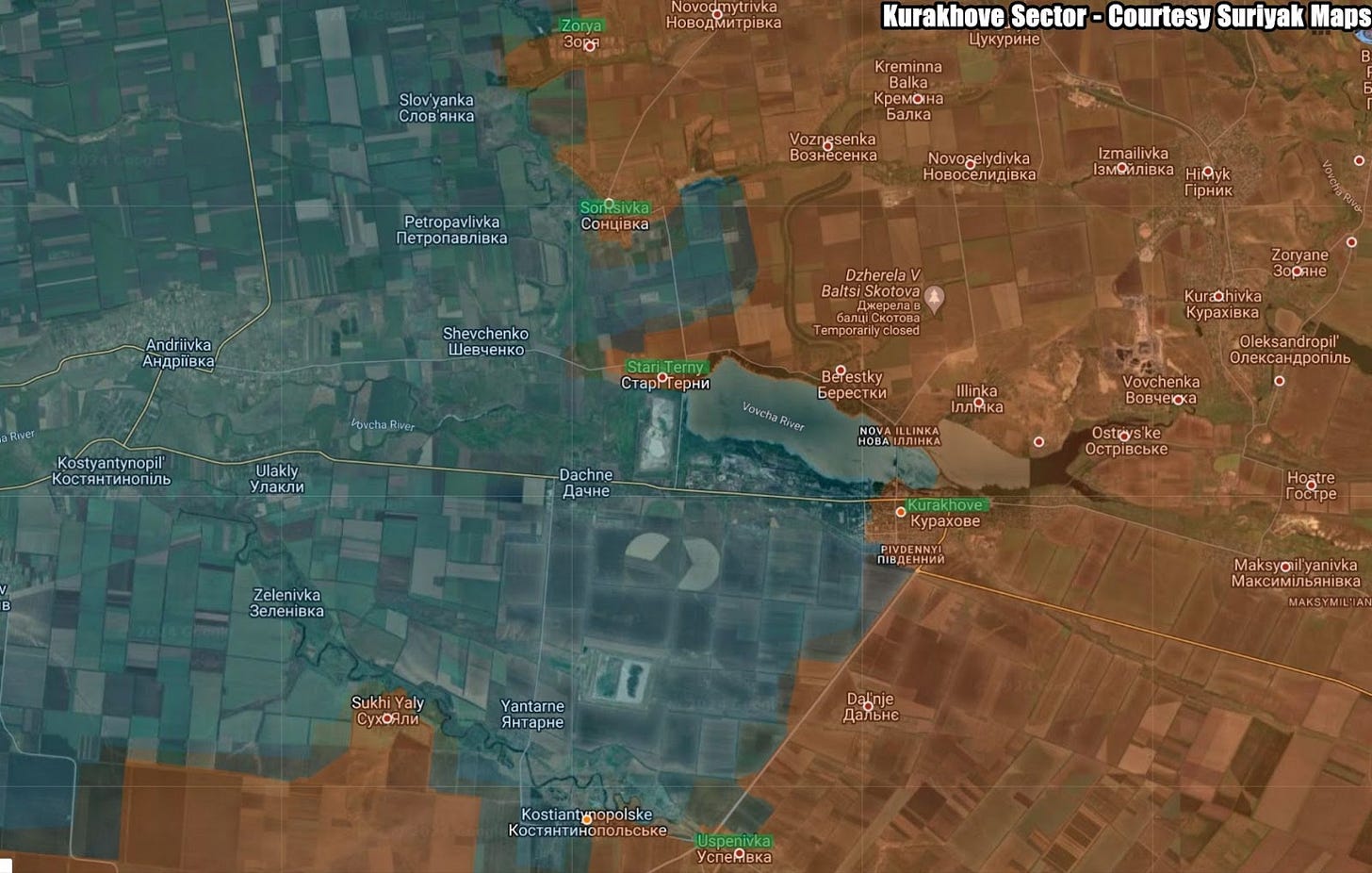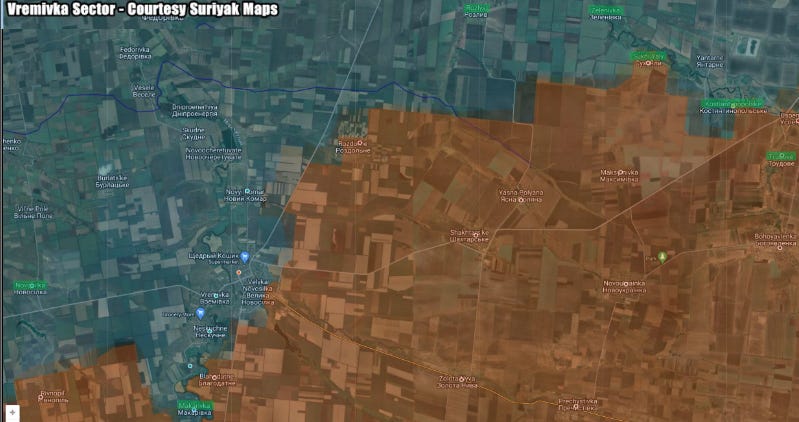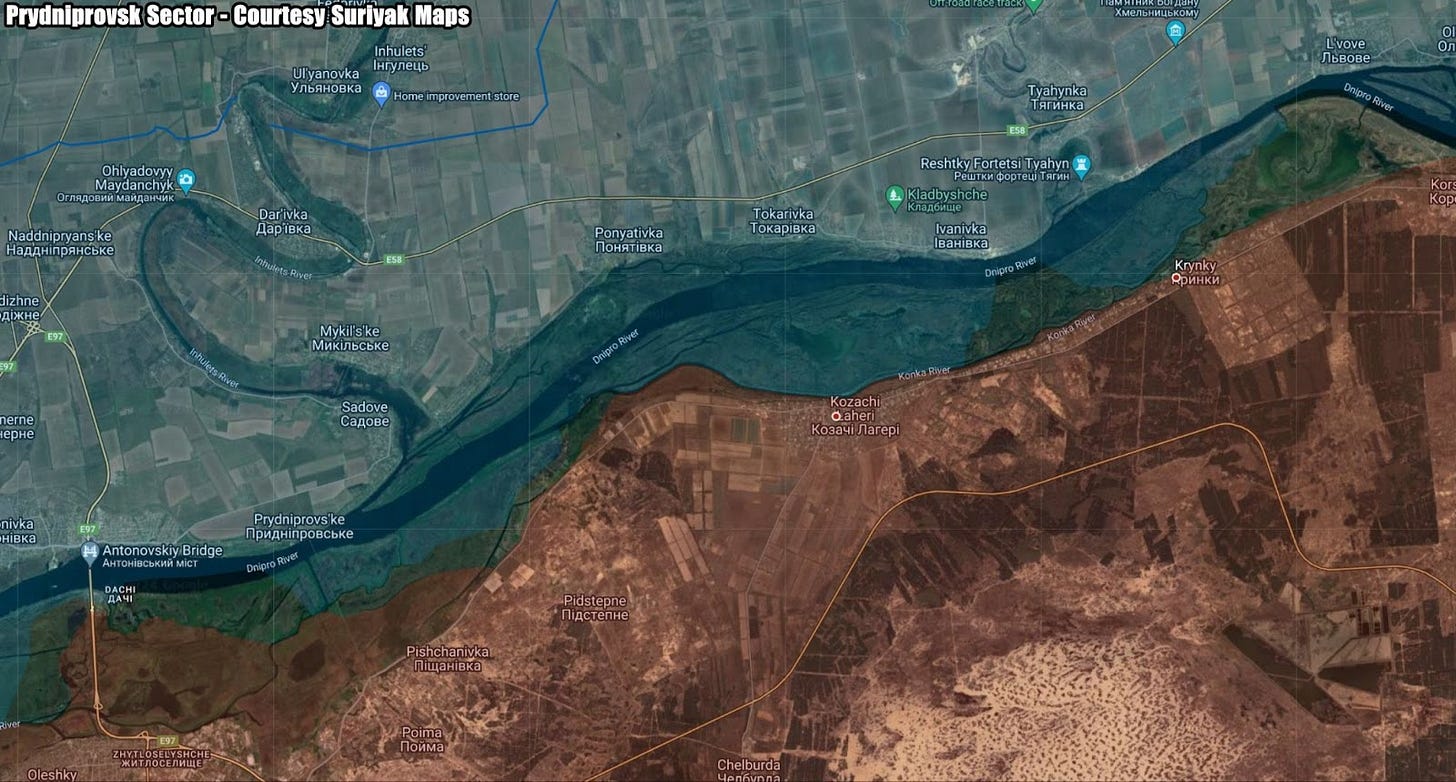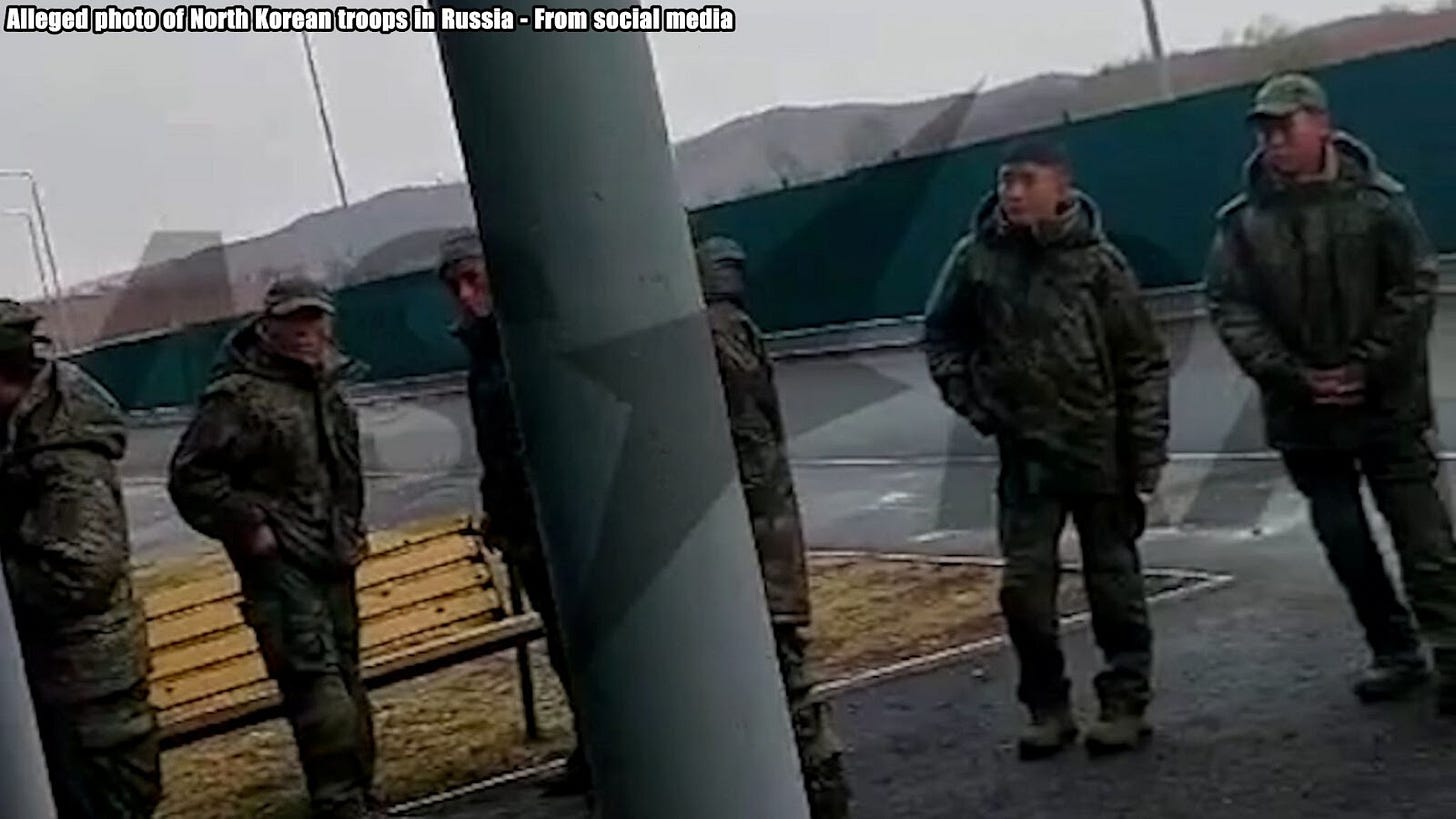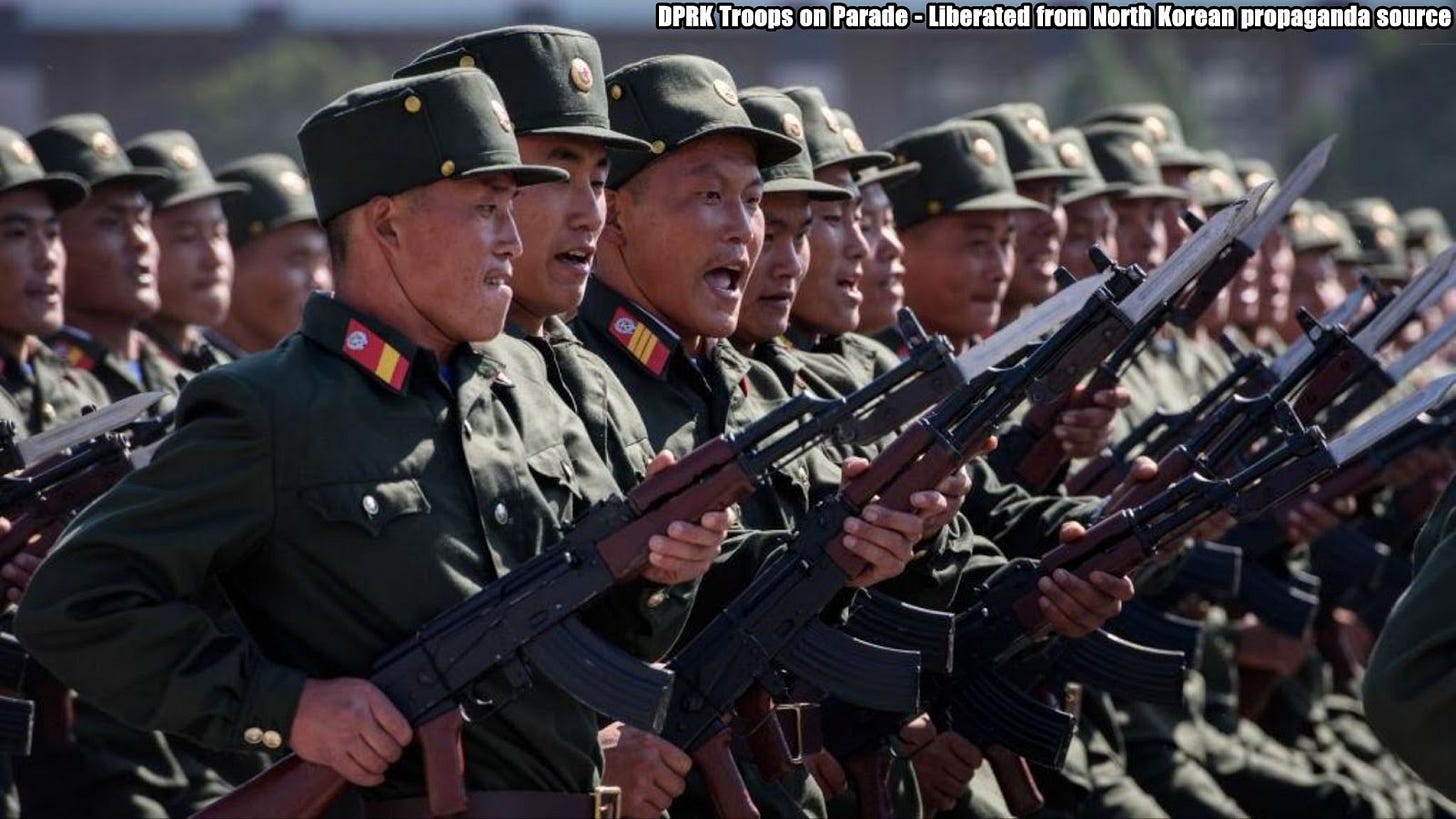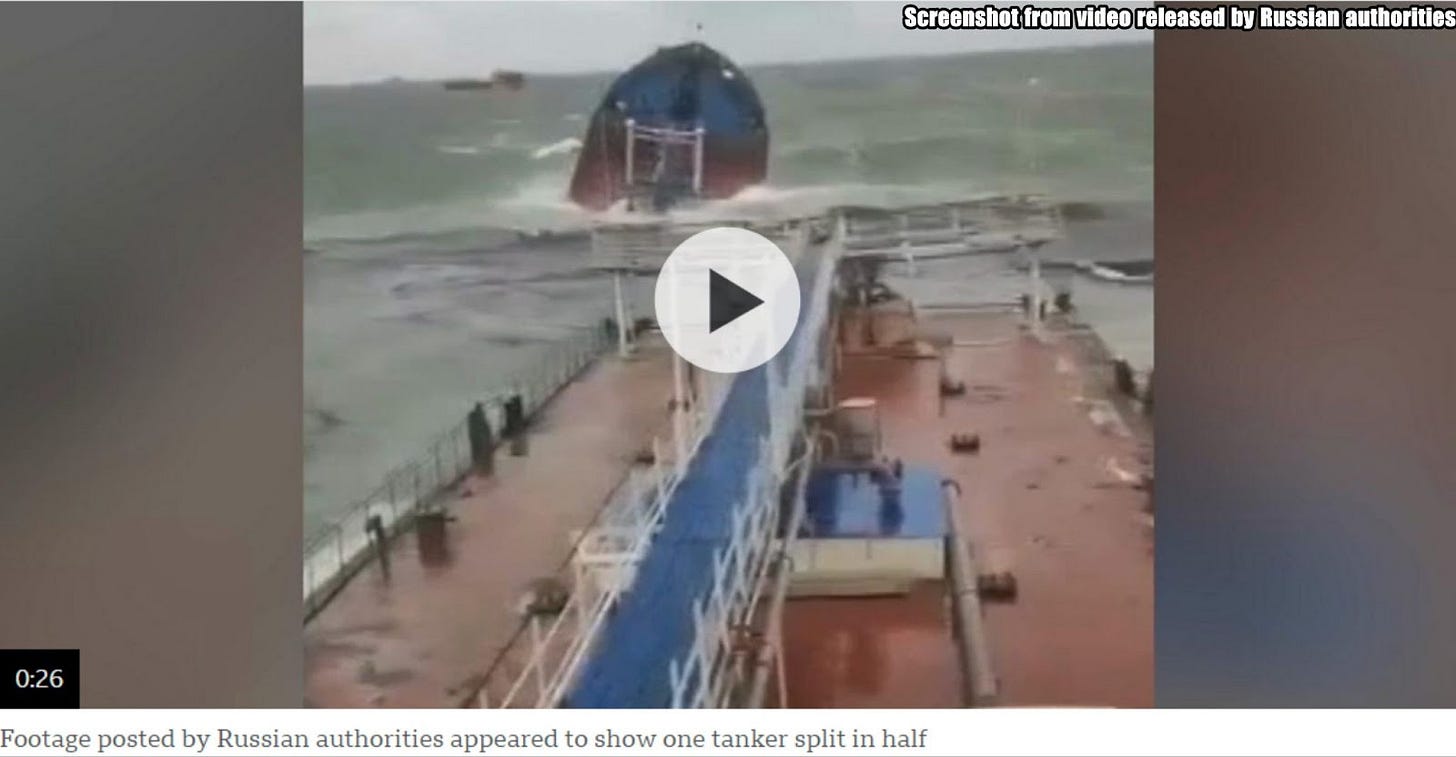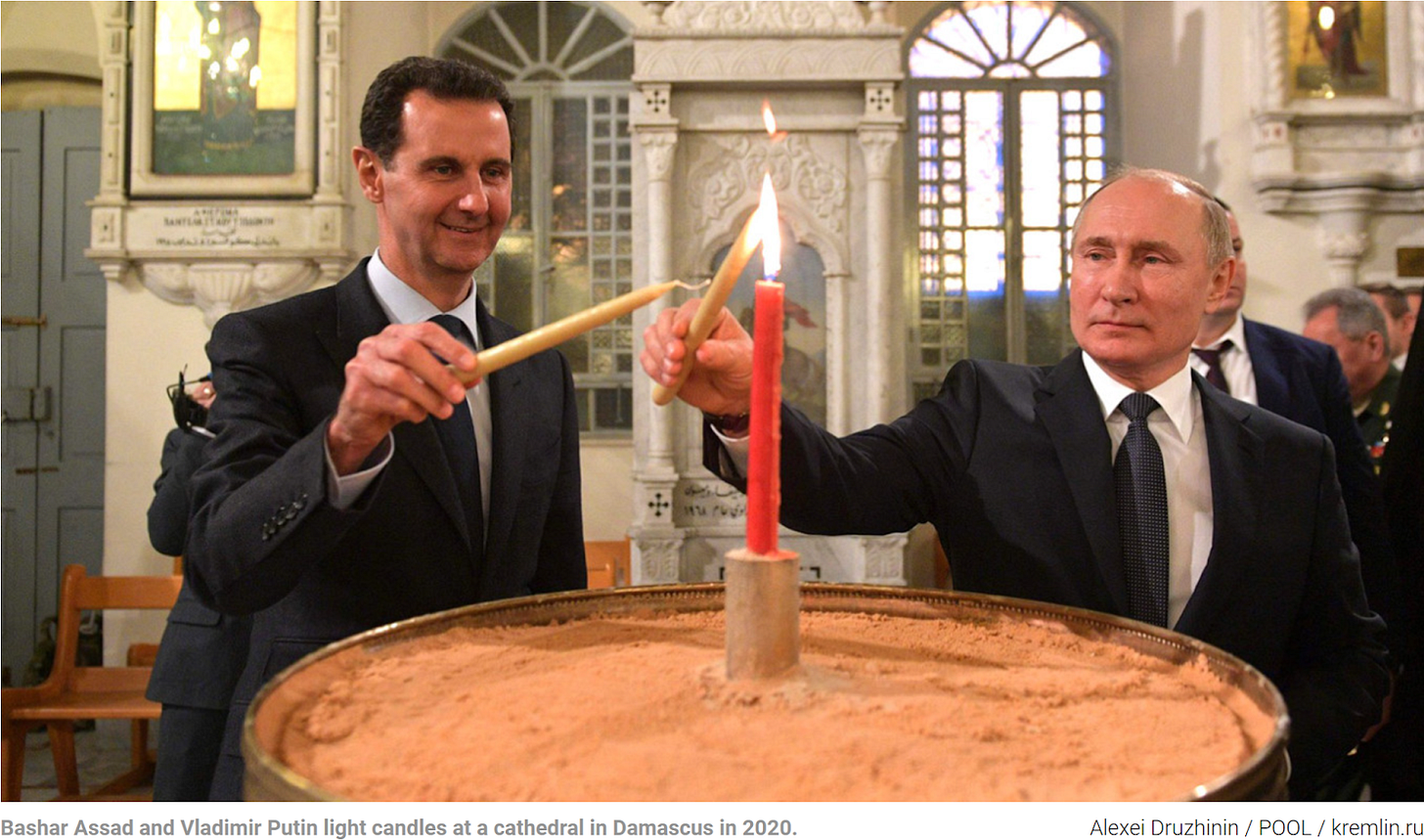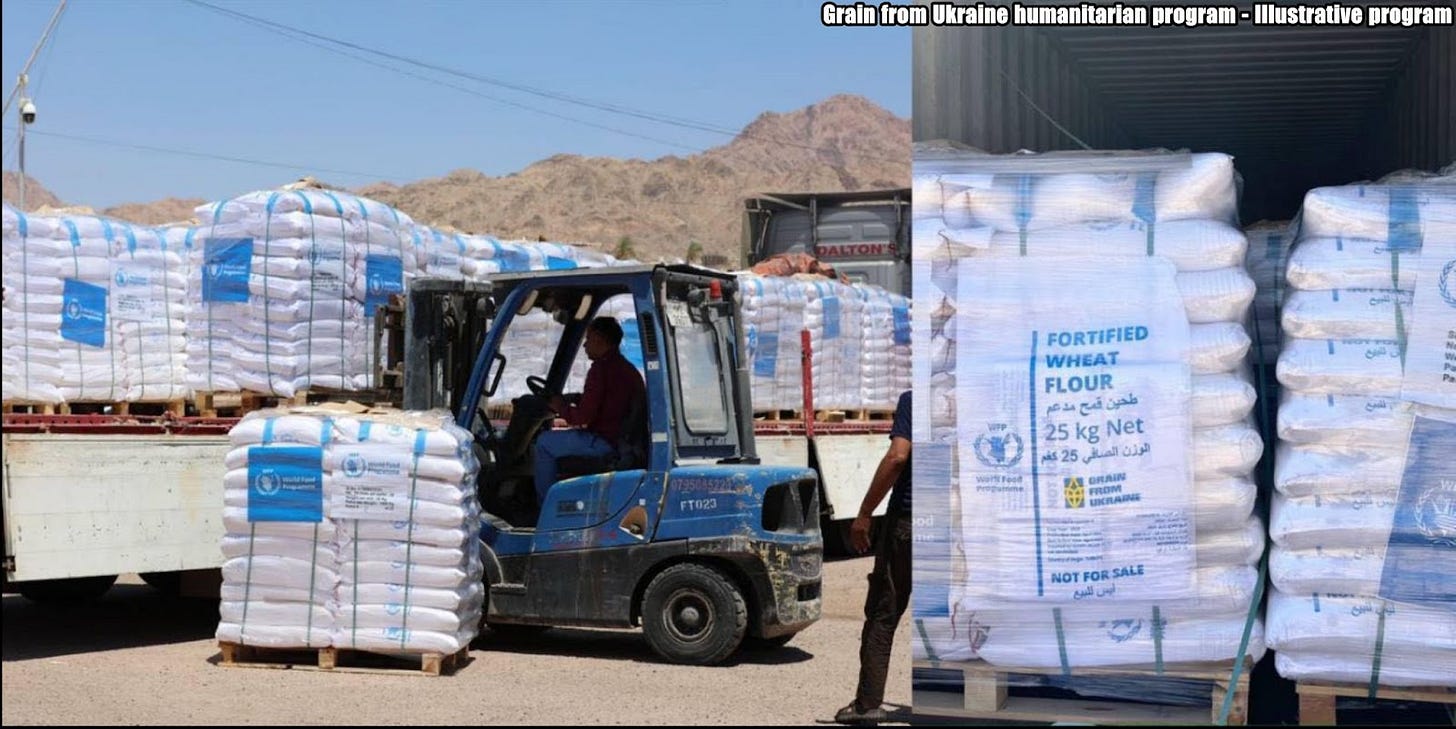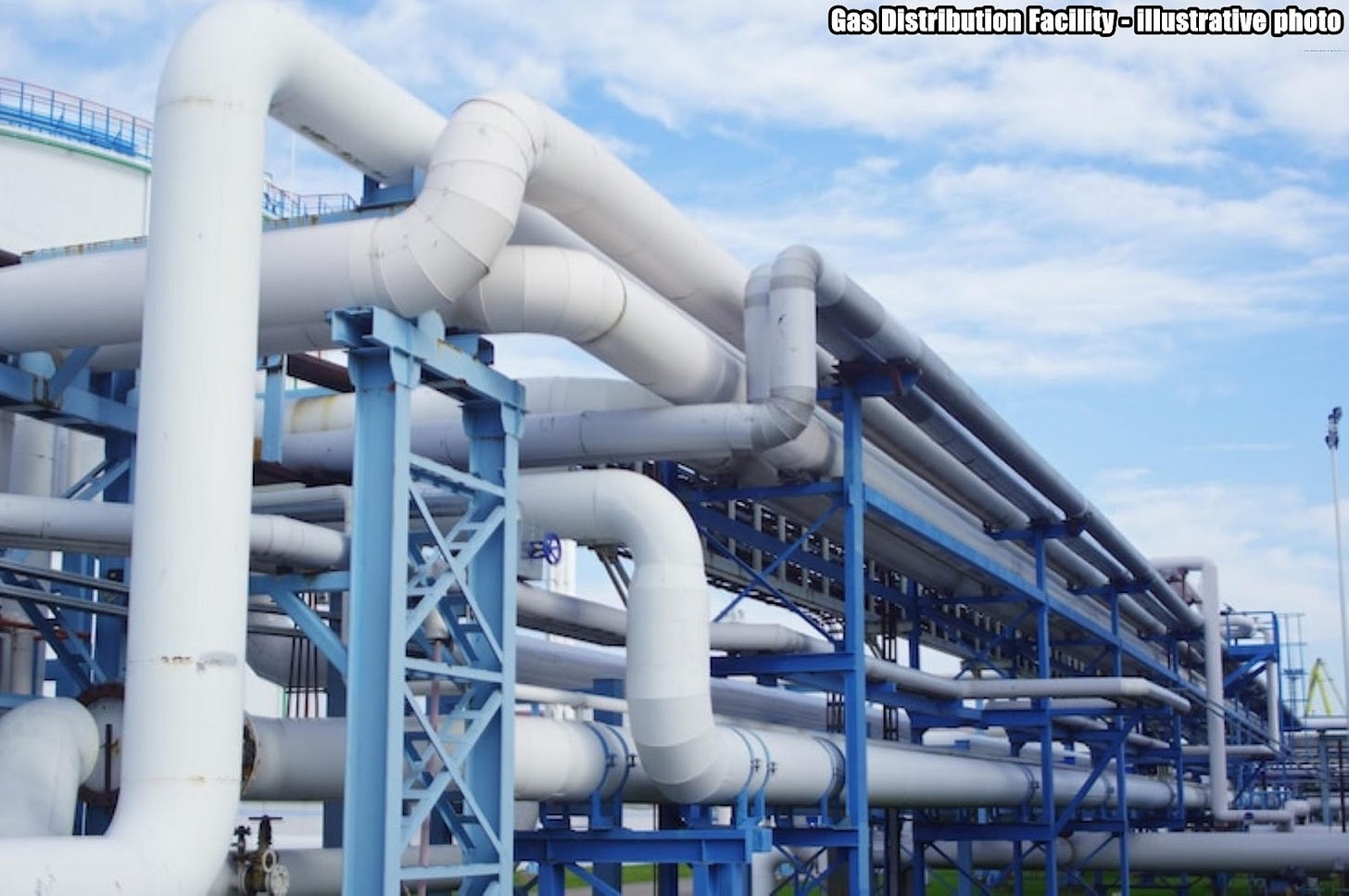Slava Ukraini! In early 2022 I began a Telegram channel aggregating news from a number of sources daily on the war in Ukraine. In June 2023 I began providing a daily draft for the Ukraine War Brief Podcast collecting news from over 70 sources daily, which formed the basis of the script. While the Podcast no longer exists I have continued to make this Brief available for my followers here on Substack for those who wish to keep up with the news from the war.
All the latest news on the Russo-Ukraine War 6 days per week
ALONG THE CONTACT LINE
GSAFU Morning Report
The General Staff of the Armed Forces of Ukraine in its Operational Information update at 22:00 on Dec 15 stated that day 1027 of the full-scale invasion of the Russian Federation against Ukraine was about to begin.
During the past two days, 276+214 combat engagements took place. Over the past 48 hours, the enemy carried out 2 missile strikes, 85 air strikes, more than 1,606 drone strikes and more than 7,400 artillery strikes across the positions of Ukrainian forces.
At the same time, Ukrainian soldiers continue to inflict losses in manpower and equipment on the occupying troops, exhausting the enemy along the entire front line and continue to disrupt the plans of Russian occupiers to advance deeper into the territory of Ukraine.
-
Air Force Daily Report
56 ENEMY UAVS WERE SHOT, ANOTHER 49 DROPPED DID NOT REACH THEIR TARGETS (LOST IN LOCATION), THREE RETURNED TO RUSSIA
➖➖➖➖➖➖➖➖➖
On the night of December 15, 2024 (from 7:00 p.m. on December 14), the enemy attacked Ukraine with an S-300 anti-aircraft guided missile and 108 Shahed attack UAVs and drones of other types from the Kursk, Orel, Bryansk, Millerovo regions - Russia.
The air attack was repelled by anti-aircraft missile troops, aviation, electronic warfare units, and mobile fire groups of the Air Force and Defense Forces of Ukraine.
As of 08:30, it was confirmed that 56 Shahed attack UAVs and drones of other types were shot down in Chernihiv, Sumy, Kyiv, Poltava, Cherkasy, Khmelnytskyi, Mykolaiv, Kharkiv, Donetsk, and Dnipropetrovsk regions.
Due to active countermeasures by the Defense Forces, 49 enemy drones did not reach their targets (lost their location), and three more returned to Russia.
Debris from downed UAVs damaged infrastructure, apartment buildings and private houses, cars, and property of citizens in several regions of Ukraine; assistance is being provided to the victims.
27 ENEMY UAVS SHOT, ANOTHER 19 DRUANS FAILED TO REACH THEIR TARGETS (LOCATIONALLY LOST)
➖➖➖➖➖➖➖➖➖
On the night of December 16, 2024 (from 01:00), the enemy attacked Ukraine with 49 attack UAVs of the "Shahed" type and drones of other types from the Bryansk and Oryol regions - Russia.
The air attack was repelled by anti-aircraft missile troops, electronic warfare units, and mobile fire groups of the Air Force and Defense Forces of Ukraine.
As of 08:30, the shooting down of 27 Shahed attack UAVs and drones of other types in Chernihiv, Sumy, Cherkasy, Khmelnytskyi, Kharkiv and Dnipropetrovsk regions has been confirmed.
Due to active countermeasures by the Defense Forces, 19 enemy drones did not reach their targets (lost their location).
No hits were recorded, and no information was received regarding damage or casualties.
The Russian Border Incursion
The Institute for the Study of War (ISW), a US based think tank, in its Dec 15 Russian Offensive Campaign Assessment reported that Russian forces continued offensive operations in the main Ukrainian salient in Kursk Oblast on Dec 15 but did not make any confirmed advances. Russian milbloggers claimed that Russian forces advanced near Cherkasskoye Porechnoye (north of Sudzha) and from Plekhovo toward Kurilovka (both south of Sudzha), but ISW has not observed confirmation of these claims.Elements of the Russian 1427th Motorized Rifle Regiment (formed during 2022 partial reserve call up) and the "Pyatnashka" International Volunteer Brigade are reportedly operating near Russkoye Porechnoye (north of Sudzha); and elements of the Russian 11th Airborne (VDV) Brigade and 810th Naval Infantry Brigade (Black Sea Fleet [BSF], Southern Military District [SMD]) are reportedly operating in Kursk Oblast
The Khortytsia operational-strategic group
(Responsible for the northeastern part of Ukraine. )
Kharkiv Sector: Over the last day Ukrainian Defense Forces repelled 9 Russian attacks in the area of Vysoka Yaruha, Vovchansk and Tykhe. 1 engagement is ongoing.
Kupyansk Sector: Russian Forces carried out 4 offensive actions against Ukrainian defensive positions near Zahryzove and Lozova. 1 engagement is ongoing.
Lyman Sector: Russian Forces carried out 18 offensive actions against Ukrainian defensive positions near Nadiya, Tverdokhilbove, Novoiehorivka, Hrekivka and Terny. 3 engagements are ongoing.
Siversk Sector: This sector has suddenly become quite active, over the last day Russian forces carried out 33 offensive actions against Ukrainian defences in the vicinity of Bilohorivka, Verkhnokamianske. Ivano-Darivka and Vyimka. 17 engagements are ongoing.
Kramatorsk Sector: Russian forces carried out 3 unsuccessful offensive actions against Ukrainian defences in the vicinity of Chasiv Yar and Stupochky.
Toretsk Sector: Over the last day Russian forces carried out 11 offensive actions with air support near Toretsk and Shcherbynivka. 4 engagements are ongoing.
The Tavria operational-strategic group
(Responsible for the central-eastern and southeastern part of Ukraine.)
Pokrovsk Sector : Over the last day, Russian Forces carried out 27 offensive actions against Ukrainian defensive positions in the vicinity of Myrolyubivka, Promin, Lysivka, Dachenske, Zelene, Pishchane and Novoolenivka. 11 engagements are ongoing.
Kurakhove Sector: Russia conducted 31 offensive actions over the last day in the vicinity of Zorya, Sontsivka, Stari Terny, Kurakhove and Uspenivka. 8 engagements are ongoing.
Vremivka Sector: Russian forces made 23 attempts to break through Ukrainian defences in the vicinity of Novosilka, Makarivka, Rozlyv, Zelenivka, Sukhi Yaly, Kostiantynopolske and Trudove.
Orikhiv Sector: In this sector, over the last day, there has been no significant change in the combat environment.
The Odesa operational-strategic group
(Responsible for Kherson, Qırım, (also known as Crimea) and the Black Sea.)
Prydniprovsk Sector: In this sector, over the last day, there has been no significant change in the combat environment. Russian forces made 3 unsuccessful attempts to dislodge Ukrainian units from their positions.
TEMPORARILY OCCUPIED TERRITORIES
Nothing major to report.
THE HOME FRONT
Suspected terrorist attack in Dnipro kills 1, injures 4
An explosion in a central neighborhood of Dnipro on Dec. 14 killed one person and injured four others, including two police officers, The Kyiv Independent reported citing Ukraine's National Police.
Ukraine's Security Service (SBU) has classified the incident as a terrorist attack and detained a suspect.
The explosion occurred at around 2:45 p.m. local time, near an administrative building in the center of Dnipro, police said. At the time, the cause of the explosion was unknown.
Police investigators and explosives experts were dispatched to the scene to determine the circumstances of the explosion.
One man was killed in the explosion, and four others were wounded, including two police officers. The injured victims are currently being treated in the hospital.
Within hours of the explosion, authorities reported that police worked jointly with the SBU to detain a suspect. The detainee is a 37-year-old local resident who allegedly acted on the instructions of Russian special services.
Dnipro, Ukraine's fourth-largest city, has served as a key logistics and humanitarian hub during the full-scale war. The city has recently been a target of intensified Russian attacks.
Russia launched its Oreshnik intermediate-range ballistic missile (IRBM) at Dnipro Nov. 21, marking the first time such a weapon has been deployed against Ukraine during the war.
Russian President Vladimir Putin claimed on Dec. 13 that Russia is preparing to attack Ukraine with another Oreshnik missile this weekend.
RUSSIAN WORLD
North Korea troops are unsurprisingly having issues integrating into the Russian command structure
The Institute for the Study of War (ISW), a US based think tank, in its Dec 15 Russian Offensive Campaign Assessment reported that North Korean forces are reportedly facing expected struggles with high casualties and poor communication with Russian forces in Kursk Oblast, likely disrupting coordination between North Korean and Russian personnel and undermining Russian military operations. Ukraine's Main Military Intelligence Directorate (HUR) reported on Dec 14 that North Korean forces operating in Kursk Oblast recently fired at Chechen "Akhmat" Spetsnaz battalion vehicles and killed eight Chechen personnel in a friendly fire incident, likely due to the language barrier between the Russian and North Korean forces.
The HUR noted that the language barrier also hinders effective combat coordination between Russian and North Korean forces. The GUR reported that a contingent consisting of Russian and North Korean servicemen in Kursk Oblast lost 200 personnel as of Dec 14 and that Ukrainian drones swarmed a North Korean position, which is consistent with recent reports of North Korean forces engaging in attritional infantry assaults. The poor integration and ongoing communication problems between Russian and North Korean forces will likely continue to cause friction in Russian military operations in Kursk Oblast in the near term.
North Korean Soldiers Precipitate 'Friendly Fire' Incident on Russian Troops, Killing 8
After North Korean soldiers were deployed in assault operations in the Kursk region, integrated with Russian marines and airborne forces, combined Russian and North Korean units are estimated to have lost approximately 200 soldiers in total, including both fatalities and injuries, Ukraine’s Military Intelligence Directorate (HUR) reported on Dec 14.
In addition, a significant language barrier hindered coordination on the battlefield. This communication gap reportedly led to an incident of ‘friendly fire’ when North Korean troops mistakenly opened fire on vehicles belonging to the Russian Akhmat battalion. The misfire resulted in the deaths of 8 of Kadyrov’s fighters.
HUR notes that around 11,000 North Korean troops are currently stationed in Russia.
Strict counterintelligence measures have been implemented in areas where they are deployed, including FSB inspections of Russian soldiers and officers, confiscation of mobile phones, and restricted access to North Korean units.
Earlier, Russia deployed a general to the frontlines in the Kursk region following complaints from North Korean soldiers about inadequate food supplies.
Two Russian oil tankers sink in the Black Sea
Two Russian oil tankers with 29 crew members on board have been heavily damaged in the Black Sea, triggering an oil spill, BBC reports citing authorities in Russia.
Footage released by Russia's Southern Transport Prosecutor's Office showed one of the tankers broken in half and sinking amid a heavy storm, with streaks of oil visible in the water.
At least one crew member was reportedly killed. The second ship was said to have drifted after sustaining damage and conflicting reports suggested it may have later run aground.
The incident took place in the Kerch Strait, which separates Russia from Crimea - the Ukrainian peninsula illegally annexed by Moscow in 2014.
President Vladimir Putin has ordered a working group to be set up to deal with the incident, headed by Deputy Prime Minister Vitaly Savelyev - and authorities are investigating for criminal negligence.
A rescue and clean-up operation is said to be under way involving tugboats, helicopters and more than 50 personnel.
"Today, as a result of a storm in the Black Sea, two tankers, Volgoneft-212 and Volgoneft-239, sank," Russia's federal sea and inland water transport agency, Rosmorrechflot, wrote in a statement.
"There were crews of 15 and 14 people on board the ships. The accident resulted in a spill of oil products," it continued.
Michelle Bockmann, an analyst at shipping industry journal Lloyd's List, said the two vessels are owned by the company Volgatanker and had a carrying capacity of around 3,500 dead weight tonnes of oil each.
The tankers are relatively small, Bockmann told the BBC. She said a tanker used for trading Russian crude oil internationally generally has a much larger carrying capacity of around 120,000 dead weight tonnes.
She said the stricken tankers were likely used for transporting oil through Russia's rivers or in coastal waters. The full extent of the oil spill and the exact fate of both ships remains unclear.
The Kerch Strait is a key route for exports of Russian grain and it is also used for exports of crude oil, fuel oil and liquefied natural gas.
In 2007, another oil tanker - Volgoneft-139 - split in half during a storm while anchored off the Kerch Strait, spilling more than 1,000 tonnes of oil.
Russian oil imports have been heavily sanctioned by allies of Ukraine since the Kremlin ordered the full-scale invasion of Ukraine in February 2022. In recent years, Russia has been accused of using a so-called ghost fleet of tankers, which are often poorly maintained and lack proper insurance, to move oil and circumvent sanctions - though Bockmann said it did not appear the tankers involved in Sunday's incident were part of that fleet.
Assad regime sent $250 million to Russia between 2018 - 2019
Bashar al-Assad’s central bank airlifted around $250mn in cash to Moscow in a two-year period when the then-Syrian dictator was indebted to the Kremlin for military support and his relatives were secretly buying assets in Russia. The Financial Times reports.
The Financial Times has uncovered records showing that Assad’s regime, while desperately short of foreign currency, flew banknotes weighing nearly two tonnes in $100 bills and €500 notes into Moscow’s Vnukovo airport to be deposited at sanctioned Russian banks between 2018 and 2019.
The unusual transfers from Damascus underscore how Russia, a crucial ally to Assad that lent him military support to prolong his regime, became one of the most important destinations for Syria’s cash as western sanctions pushed it out of the financial system.
Opposition figures and western governments have accused Assad’s regime of looting Syria’s wealth and turning to criminal activity to finance the war and its own enrichment. The shipments of cash to Russia coincided with Syria becoming dependent on the Kremlin’s military support, including from Wagner group mercenaries, and Assad’s extended family embarking on a buying spree of luxury properties in Moscow
Syria’s relations with Moscow deepened dramatically as Russian military advisers bolstered Assad’s war effort and Russian companies became involved in Syria’s valuable phosphate supply chain. “The Syrian state could be paying the Russian state for a military intervention,” said Malik al-Abdeh, a London-based Syrian analyst.
In February 2019 the central bank flew in around €20mn in €500 notes. In total there were 21 flights from March 2018 to September 2019 carrying a declared value of over $250mn.
There were no such cash transfers between Syria’s central bank and Russian banks before 2018, according to the records, which started in 2012.
In 2019 the FT reported that Assad’s extended family had from 2013 bought at least 20 luxury apartments in Moscow using a complex series of companies and loan arrangements.
Repeated sabotage highlights Russian rear security failures
Another Russian military aircraft was reportedly set ablaze at the Krymsk airbase in Krasnodar Krai, allegedly by Ukrainian operatives, according to claims circulating on Russian social media channels. Defence Blog reports.
The incident has reignited criticism of Russian military security measures, with both independent analysts and pro-Russian commentators raising concerns over repeated breaches at sensitive sites.
The Voennyy Osvedomytel Telegram channel, which is closely associated with Russian military insiders, noted, “This is far from the first instance since the beginning of hostilities where enemy agents, allegedly bribed, have infiltrated ostensibly secure military facilities, conducted sabotage, filmed the acts, and departed without incident.”
The channel highlighted systemic vulnerabilities in the Russian military’s rear security. “Despite years of similar incidents, surveillance cameras, motion detectors, guard posts, and sentries remain conspicuously absent at rear facilities,” the statement added.
The Krymsk incident is the latest in a series of reported sabotage operations targeting Russian military aviation assets. Similar events cited by Voennyy Osvedomytel include:
Arson attack on Ka-52 helicopters at Veretye airfield in Pskov Oblast.
Arson attack on a Su-34 fighter-bomber at Shagol airbase in Chelyabinsk.
Arson attack on a Ka-32 helicopter at Ostafyevo airfield in Moscow.
Arson attack on a Mi-8T helicopter at Novy Urengoy airport in Yamal-Nenets Autonomous Okrug.
Arson attack on a Su-24 bomber at Chkalov Aviation Plant in Novosibirsk.
Arson attack on a Mi-8AMTSh helicopter at Omsk airbase.
Arson attack on a Su-27P fighter at Krymsk airbase in Krasnodar Krai.
Each incident followed a similar modus operandi, involving operatives infiltrating airbases, planting incendiary devices or explosives, and escaping undetected. These repeated breaches have sparked a wave of outrage among Russian propagandists and military commentators.
While the Russian government has not officially commented on the Krymsk incident, the pattern of infiltrations underscores a growing challenge for the country’s military apparatus. The apparent ease with which such attacks have been executed has raised questions about the robustness of security measures at critical defense installations.
INTERNATIONAL NEWS
Ukraine plans to send humanitarian aid to Syria to prevent a food crisis.
Ukraine is preparing to send humanitarian aid to Syria in order "to help prevent a food crisis," President Volodymyr Zelenskyy announced on Dec. 14. The Kyiv Independent reports.
The announcement comes a week after the Russia-backed regime of former Syrian President Bashar al-Assad collapsed on Dec. 8 amid a large-scale rebel offensive.
Kyiv will contribute to stabilization in Syria in the aftermath of Assad's fall, Zelensky said.
"We are ready to help Syria prevent a food crisis," he said.
"Including through the Grain from Ukraine humanitarian program. I have instructed the government to organize food deliveries in cooperation with international organizations and partners willing to help."
Zelensky called on global partners to assist in ensuring a stable peace in Syria, which endured years of civil war "ignited with ... Russia's involvement."
Kyiv launched the Grain From Ukraine initiative in fall 2022. Since then, the program has saved 20 million people from hunger, according to Zelensky.
Ukraine is one of the world's leading agricultural producers and has been a major supplier of grain and other products to countries in Africa and Asia.
Georgia elects “illegitimate” pro-Russian president as 65% back ongoing EU protests
Mikheil Kavelashvili, a former footballer and member of the ruling Georgian Dream party, has been elected president of Georgia by the country’s parliament in a process the opposition calls illegitimate. Euromaidan Press reports.
The election took place on Dec 14, amid ongoing protests against Georgian Dream’s victory in the fiercely disputed Oct 26 parliamentary elections.
The opposition parties, current President Salome Zourabichvili, and tens of thousands of citizens reject the parliamentary election results, alleging widespread electoral fraud. They are demanding new elections under international oversight. The allegations of fraud have been backed up by statistical analysis indicating that 15% of the Georgian Dream’s votes were stolen.
Kavelashvili is supposed to replace Zourabichvili, who has been an independent voice resisting Georgian Dream’s pro-Russian policies, thanks to constitutional changes introduced by the party in 2017. However, in a stunning development, Zourabichvili declared she would remain in office beyond her term, defying the changes that critics argue allow Georgian Dream to consolidate power.
Zourabichvili, describing her office as “the only independent institution and the sole legitimate institution left,” announced she would gather opposition parties and public representatives to “jointly manage the political aspect” of the growing resistance movement. “I will remain as your president, there is no legitimate parliament, therefore an illegitimate parliament cannot elect the president,” she said.
EU to Tackle Energy Security as Ukraine Transit Deal Nears End
European Union nations on Monday will discuss preparations for the winter with the gas transit agreement between Russia and Ukraine set to expire and the bloc trying to phase out reliance on fossil fuels from Moscow. Bloomberg reports.
At the first meeting with Denmark’s Dan Jorgensen as the bloc’s new energy commissioner, ministers are set to weigh options to lower prices and strengthen the competitiveness of EU industry during the green transition.
“Energy affordability remains a pressing concern, with volatile prices driven by geopolitical tensions, supply chain disruptions, and reliance on fossil fuel imports,” Hungary, which will be chairing the meeting in Brussels as the holder of the rotating EU presidency, said in a document shared with energy ministers.
Strengthening EU industries during the clean transition has risen to the top of the European political agenda after a backlash triggered in part by an unprecedented energy crisis that pushed power and gas prices to records two years ago following the Russian invasion of Ukraine.
During Monday’s ministerial meeting, the commission will update member states about preparations for this winter as the intergovernmental transit deal between Kyiv and Moscow, which was the basis for Russian pipeline gas shipments to Europe, comes to an end on Dec. 31.
The termination of the agreement between Ukraine and Russia has already been priced into European gas markets, and the region will be able to find alternative supplies, according to an assessment by the EU’s executive branch seen by Bloomberg News earlier this week.
While European fuel prices are a far cry from the peaks reached during the crisis in 2022 — thanks to increased imports of liquefied natural gas that replaced most of the Russian flows — they remain elevated, with many households and businesses struggling with high bills.
The EU has long argued that member countries still importing Russian gas via the Ukraine route — most notably Austria and Slovakia — can do without the supplies. The commission has said it won’t enter into negotiations to keep the route open.
Nevertheless, gas buyers from Slovakia and Hungary are continuing negotiations to keep gas flowing after the transit deal expires, with the proposal involving a swap deal between Azerbaijan and Russia.
MILITARY & TECH
Ukraine produces almost 100 new Peklo missile-drones, media reports
Almost 100 of Ukraine's new Peklo missile-drone hybrids have been produced as the weapon entered serial production, the Kyiv Independent reported on Dec 16 citing Ukrainska Pravda.
The news comes amid Ukraine's efforts to ramp up production of long-range drones and missiles as part of the country's resilience plan. President Volodymyr Zelensky said Ukraine aims to produce at least 30,000 long-range drones next year.
While some details of Peklo's capabilities remain undisclosed for security reasons, Zelensky highlighted the weapon as a "fundamentally new type." The Peklo has a range of 700 kilometers (430 miles) and a speed of 700 km/h (430 mph). Officials reportedly said that the system has already been successfully deployed.
The weapon represents a mix of drone and missile capabilities, functioning as a long-range drone equipped with a jet engine and more advanced guidance system, Ukrainska Pravda wrote.
According to the outlet, 70% of Peklo's components are produced in Ukraine, but importing the rest into the country represents a serious bottleneck. The interchangeability of elements bridges estimated gaps in supply; for example, Peklo can reportedly run on different engines, depending on their availability on the market.
Long-range domestic weapons are critical to Ukraine’s defense strategy. They provide the country's military with an alternative to Western arms, whose use is often restricted. They also compensate for the lack of artillery ammunition on the battlefield.
Achieving the target number of missile production next year also means that Ukrainian rockets will be smaller than usual, contradicting Russia’s bet on bigger missiles such as the recently developed Oreshnik.
That’s it for today’s Brief folks if you would like to keep up with events in Ukraine daily please consider subscribing.
Feel free to share this update with your friends. Heroyam Slava!







